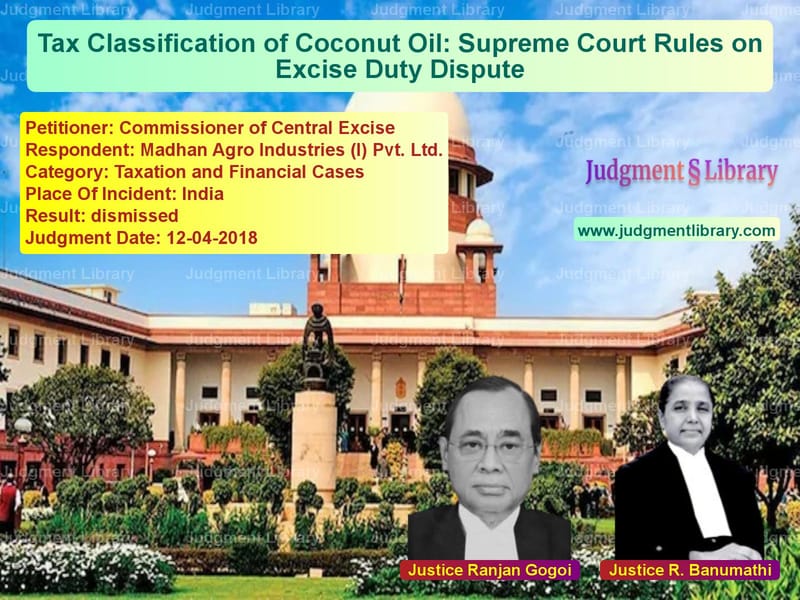Tax Classification of Coconut Oil: Supreme Court Rules on Excise Duty Dispute
The Supreme Court of India recently delivered a significant judgment in the case between the Commissioner of Central Excise and Madhan Agro Industries (I) Pvt. Ltd., concerning the classification of coconut oil under the Central Excise Tariff Act, 1985. The core dispute revolved around whether coconut oil packed in small containers should be classified under Heading 1513 as a fixed vegetable oil or under Heading 3305 as a hair oil.
Background of the Case
The case arose from appeals filed by the Commissioner of Central Excise against the Customs, Excise, and Service Tax Appellate Tribunal (CESTAT) rulings that coconut oil manufactured and packed in “small containers” should be classified under Heading 1513 rather than Heading 3305.
The dispute specifically concerned coconut oil sold in packages of up to 2 liters for Madhan Agro Industries and up to 500 ml for job workers of Marico Limited. The Revenue (Excise Department) contended that these smaller packs were marketed as hair oil and should be taxed accordingly under Heading 3305.
Petitioner’s Arguments (Revenue)
- The Revenue argued that the classification of coconut oil in small containers should be under Heading 3305 as “hair oil” based on market perception.
- It contended that a market survey indicated that consumers purchase small packs primarily for use as hair oil rather than as edible oil.
- Reliance was placed on the General Rules for Interpretation of the Tariff Act, particularly Rule 1 and Rule 3, which emphasize classification based on product characteristics and market perception.
- The Revenue cited previous decisions emphasizing the “common parlance test” for classification, arguing that coconut oil in small packs is commonly understood as hair oil.
Respondent’s Arguments (Madhan Agro Industries and Others)
- The respondents maintained that coconut oil, irrespective of the packaging size, remains a fixed vegetable oil and should be classified under Heading 1513.
- They argued that coconut oil was marketed as 100% pure edible oil, with packaging explicitly marked as “edible oil.”
- The respondents pointed out that the amendment to the Excise Tariff Act in 2005 was meant to align with the Harmonized System of Nomenclature (HSN), and the new Heading 1513 was introduced specifically for coconut oil.
- They cited earlier circulars issued by the Central Board of Excise and Customs (CBEC), which had clarified that coconut oil is not a “preparation for use on the hair” unless explicitly labeled as such.
Supreme Court’s Observations
The Court analyzed the classification dispute by referring to the General Rules for Interpretation, Section Notes, and Chapter Notes in the Tariff Act.
- The Court emphasized that coconut oil remains coconut oil irrespective of packaging size and that packaging does not alter its fundamental nature.
- Chapter Note 3 of Chapter 33 specifies that products classified under Headings 3303 to 3307 must be put up in packings “of a kind sold by retail for such use.” However, the Court found that there was no indication on the packaging of coconut oil suggesting that it was meant for use as hair oil.
- The Court rejected the argument that market perception alone could determine classification, ruling that statutory provisions and product characteristics must be the primary factors.
- It was noted that the Revenue had previously issued a clarification that coconut oil is classifiable under Heading 1513, and the subsequent attempt to classify small packs differently was inconsistent.
Key Judicial Findings
- Classification Based on Product Identity: The Court ruled that coconut oil in small packs does not lose its identity as coconut oil and remains classifiable under Heading 1513.
- Market Perception Is Not Decisive: The Court held that consumer perception alone cannot dictate tax classification.
- Packaging and Size Do Not Change Nature: The ruling affirmed that simply selling coconut oil in smaller packs does not transform it into a “hair oil.”
- CBEC Circulars Affirm the Classification: The judgment aligned with earlier CBEC circulars stating that coconut oil is not classifiable under Chapter 33 unless specifically labeled for hair application.
Final Judgment
The Supreme Court dismissed the appeals filed by the Revenue and upheld the decisions of the Tribunal, ruling that coconut oil in small packages remains classifiable under Heading 1513 as a fixed vegetable oil.
This judgment serves as a landmark precedent for tax classification disputes, reinforcing that product classification under the Excise Tariff Act must be based on statutory interpretation rather than consumer perception.
Petitioner Name: Commissioner of Central Excise.Respondent Name: Madhan Agro Industries (I) Pvt. Ltd..Judgment By: Justice Ranjan Gogoi, Justice R. Banumathi.Place Of Incident: India.Judgment Date: 12-04-2018.
Don’t miss out on the full details! Download the complete judgment in PDF format below and gain valuable insights instantly!
Download Judgment: Commissioner of Cent vs Madhan Agro Industri Supreme Court of India Judgment Dated 12-04-2018.pdf
Direct Downlaod Judgment: Direct downlaod this Judgment
See all petitions in Income Tax Disputes
See all petitions in Customs and Excise
See all petitions in Tax Refund Disputes
See all petitions in Judgment by Ranjan Gogoi
See all petitions in Judgment by R. Banumathi
See all petitions in dismissed
See all petitions in supreme court of India judgments April 2018
See all petitions in 2018 judgments
See all posts in Taxation and Financial Cases Category
See all allowed petitions in Taxation and Financial Cases Category
See all Dismissed petitions in Taxation and Financial Cases Category
See all partially allowed petitions in Taxation and Financial Cases Category







